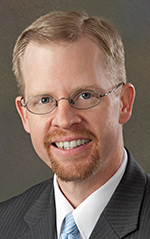Voices: Return again to the well of God’s love
Jesus loves you. We say this phrase to one another so often, we easily forget the power of this declaration. The truth of this good news, of this gospel, must never be so familiar to us we lose our sense of awe and gratitude at the amazing grace of such love.
 Zac Harrel
Zac Harrel
We must return again and again to the well of God’s love, for it is what our desperately thirsty hearts need.
In Mark’s account of the baptism of Jesus—and in the other Gospel accounts as well—we see the Father proclaim from heaven over Jesus, “You are my beloved Son; with you I am well-pleased.” One of the amazing things about the gospel is when we place our faith in Jesus, our sins not only are forgiven; we are declared to be in Christ so that when the Father looks to us, he sees the obedience, holiness and righteousness of his Son. By our faith in Jesus, by giving our lives to Christ, we are adopted into the family of God. We are made sons and daughters of the King.
What this means for us is that in Jesus when the Father looks at us, he makes this same proclamation over our lives. “You are my son. You are my daughter. With you I am well-pleased.”
 This love …
This love …
This love, this pleasure the Father takes in his children should sustain us through the peaks and valleys of our lives. No matter what we walk through, we can continue to come back to this declaration of love and acceptance over and over again.
Sometimes our lives don’t seem to match up with what we know of who God is and the promises he makes to his people, and in our moments of doubt and anxiety, we continually can point our hearts back to this truth. Jesus loves us, and in him our heavenly Father is pleased with us. In moments of despair, we look to Jesus. The Cross and the Resurrection remind us of his love, and our identity in him reminds us of the Father’s pleasure with his children.
God’s love for us is proclaimed over us in Christ in this declaration from heaven at the baptismal waters of Jordan. This love is ours in Jesus, because of the love of Jesus for us who are lost and hurting.
Love made clear
Jesus’ love is made clear in his sacrifice on our behalf at Calvary. “Greater love has no one than this, that someone lay down his life for his friends. You are my friends if you do what I command you” (John 15:13-14). The Apostle Paul tells us in Romans 8:39 that nothing in this world can separate us from this love.
Jesus loves us. This must never become dull to us, because it is a world-changing, life-transforming truth.
I am convinced one of the hardest things for us to do is just let God love us. We can’t limit or qualify this love. He loves us, period, full stop. Rest in this love, rejoice in this love and walk in this love through every season this life throws at you.
The other part of the baptismal declaration also is ours in Christ. The Father is pleased with us. In some ways, it is easier for us to proclaim God’s love than it is for us to proclaim God’s pleasure with us. But in Jesus, God is pleased with us. He accepts us. The gospel declares us holy and righteous in Christ.
God’s pleasure
Now, the process of making us completely holy won’t be complete this side of glory, but we already are walking and living in God’s pleasure.
Shame, guilt and our past try to break us. The truth of God’s pleasure in his children reminds us shame, guilt and our past have no ultimate power over us. Our Father is pleased with us, and there is nothing shame, guilt or our past can do to change this.
Sometimes, doubt and despair overwhelm our hearts. Sometimes, life puts us through seasons when we wonder about the love and goodness of God. In those moments, our hearts must return to the love of Jesus for us, revealed most clearly in his cross and in his resurrection. They must return to the truth that our identity is in him; we are sons and daughters of the King, who are loved and with whom our Father is well-pleased.
Zac Harrel is pastor of First Baptist Church in Gustine, Texas






